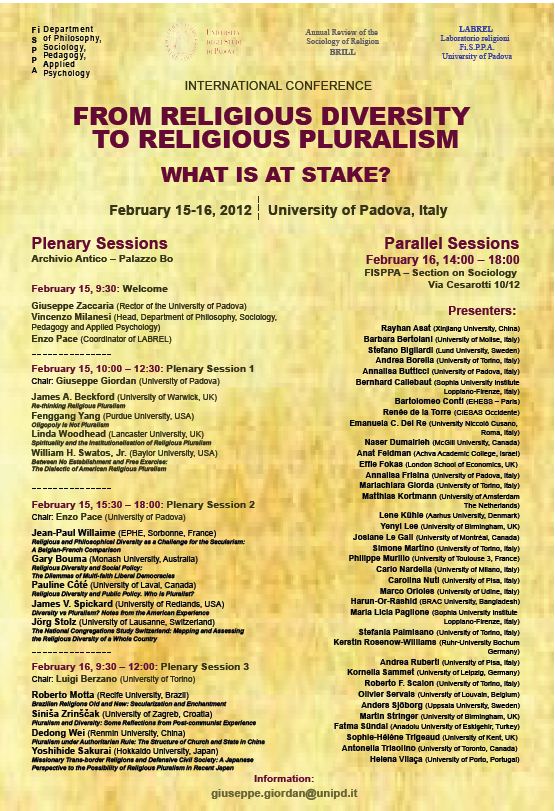Thursday 4th July – Saturday 6th July 2019
Edgbaston Park Hotel, Birmingham, UK.
Please note: support for attendance is available.
Organised by the Science and Belief in Society Research Group at the University of Birmingham, UK this is the first conference launching the new, International Network for the Study of Science and Belief in Society.
In the last decade there has been significant growth in social scientific scholarship on science and religion, complementing the more established historical research into the subject. Greater attention is being paid to the varied ways in which perceptions of science are influenced by religious and non-religious belief, identity, community and conflict in different geographical, cultural and historical contexts. The purpose of this international conference is to bring together researchers with backgrounds in sociology, science and technology studies, psychology, political science, history, social anthropology, and related humanities or social science disciplines to discuss perspectives on the overarching topic of science and belief in society.
Abstracts are invited for the conference relating to the following themes:
- · The social scientific and historical study of the relationship between science and religious and/or non-religious belief and identity;
- · Public perceptions of the relationship between science, religion and non-religion and their respective roles in society;
- · National and international comparative perspectives on the study of science, religion and belief in society;
- · Past and present media or popular representations of science, religion and belief in society;
- · The past or present roles of science, rationalism, religion and belief in national, social or cultural identity and related geopolitical narratives;
- · Multidisciplinary and interdisciplinary approaches to the study of science, religion and non-religion in society;
- · Methodological approaches to, and issues in, the study of science, religion and belief in society;
- · Avenues for future research and developments within the social scientific and historical study of science, religion and belief in society;
- · Public policy research relating to any aspect of public policy that intersects with issues connected to science, religion and belief in society. Including studies on theimpact of publics’ views on science and religion on policy making, and provision for religious, spiritual or non-religious communities across a range of geographies and issues (e.g. healthcare provision, educational policy, science policy, environmental policy or development);
- · International studies of religious or spiritual communities’ perspectives on the intersection, and possible relationships, between science and religion over time.
We are interested in papers that relate to any aspect of STEMM in society (science, technology, engineering, medicine, and mathematics) and that discuss any religious, spiritual or non-religious tradition, position or worldview, including unbelief.
Keynote papers will be given by historian Professor Peter Harrison, Australian Laureate Fellow and Director of the Institute for Advanced Studies in the Humanities at the University of Queensland (Australia), and psychologist Professor Cristine Legare, associate professor of psychology and the director of the Evolution, Variation, and Ontogeny of Learning Laboratory at The University of Texas at Austin (USA).
Individual paper submissions:
To submit a paper proposal, please send an abstract of no more than 300 words, alongside a biographical note of no more than 200 words including name, institutional affiliation, email address and if possible a web-link to your institutional bio page.
Biographies of successful applicants will be added to the International Network’s Research Directory when our new website launches in the spring. Please indicate on your application if you would like to opt out of being added to the Research Directory.
Panel session proposals:
We will also be accepting a limited number of panel proposals with a maximum of four speakers. To submit a panel proposal, please send a session summary of no more than 250 words alongside abstracts of no more than 300 words for each paper and biographical notes of no more than 200 words for each contributor (please include institutional affiliation(s), e-mail contact details, and other info as above).
Individual or panel session submissions may cross over several of the themes listed above, and those intending to submit papers are encouraged to consider the relevance of their work to other academic disciplines.
Please send all individual paper and session proposals to Dr Harris Wiseman (h.wiseman@bham.ac.uk) for the attention of the conference organisers, Professor Fern Elsdon-Baker (University of Birmingham), and Dr Alexander Hall (University of Birmingham).
All abstracts must be submitted by 1st March 2019.
Conference Costs and Bursaries:
Please note that for all successful applicants, accommodation and registration costs will be covered by the International Network for the Study of Science and Belief in Society as part of a 1 year grant from the Templeton Religion Trust.
In addition to this, a limited number of bursaries are available to support those who may not have institutional support to attend international conferences, including but not limited to: postgraduate, early career, retired, or low income or unwaged. To request this additional support please e-mail Dr Harris Wiseman at h.wiseman@bham.ac.uk, including your contact details, a short biography (including a clear statement regarding your career stage), your abstract and a statement of interest to be considered for one of the bursaries. We also have a range of other bursaries for covering other needs (e.g. support with day care costs). The deadline for submission of bursary applications is 1st March 2019.
Please note that we will be running a fully funded early career workshop in the days prior to this conference, but this will be announced and advertised via a separate call.
Key Dates:
- Abstract submission: Open now
- Deadline for abstracts and conference bursary applications: 1st March 2019
- Decision notification: 15th March 2019
- Registration opens: 15th March 2019
- Registration deadline for presenters: 29th March 2019


